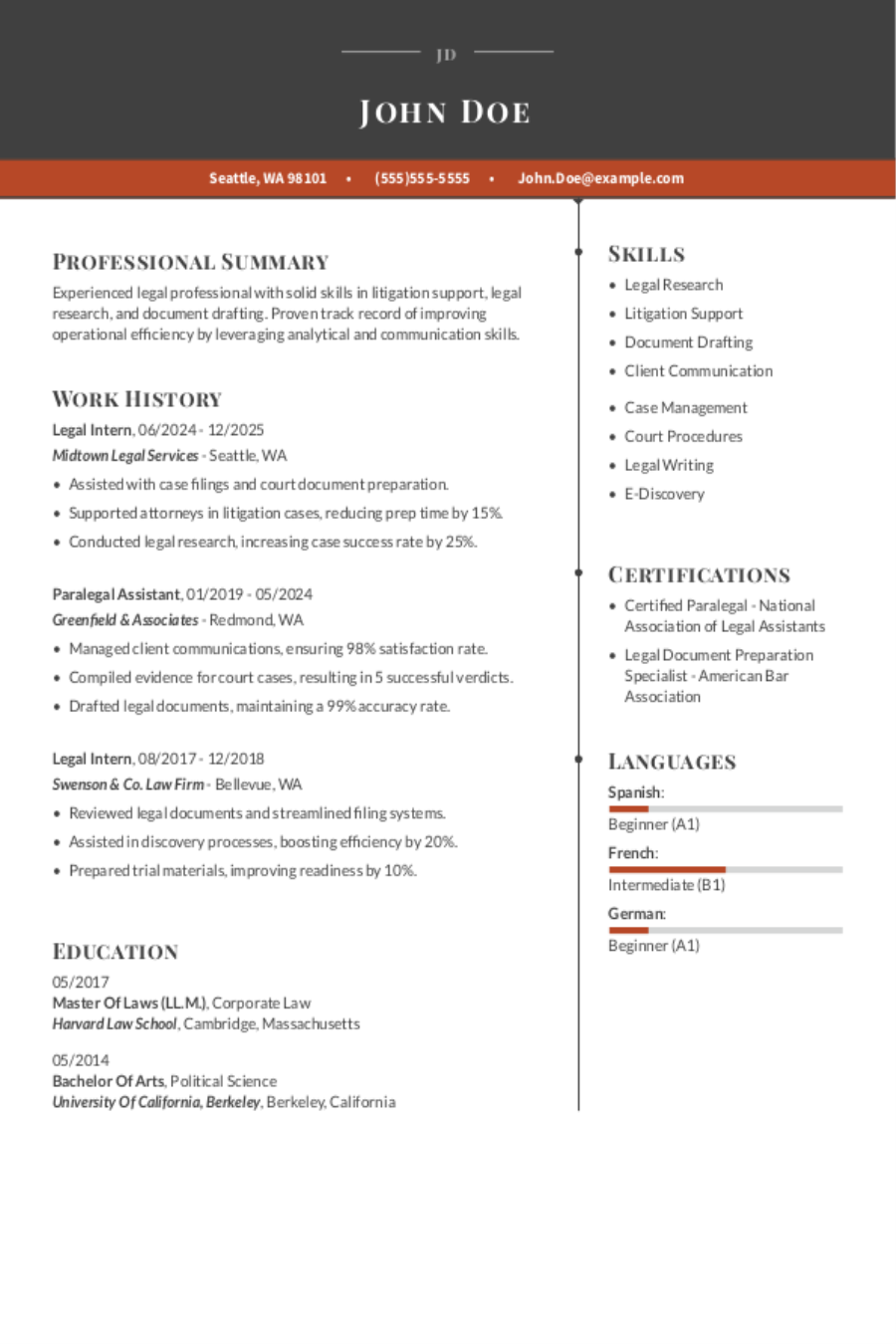Artificial intelligence (AI) skills have become a valuable asset in today's job market. Employers seek candidates who can use AI to solve complex problems, analyze data and improve processes that positively impact their organizations.
If you have these skills, then properly showcasing them is crucial to getting noticed by employers. We'll show you how.
In this article, you will find:
- Why AI skills are essential for job seekers.
- Key sections of your resume to include AI-related expertise.
- Examples of AI skills, projects and certifications.
- Tips for incorporating AI skills into your resume.
Want to create your resume quickly and easily? With our AI Resume Builder you can upload an old resume or create a new one and in just a few clicks, you will be ready to go. Check out our dozens of templates and fill them out with the content suggestions the builder generates to help you describe your career today!
Why AI Skills Are Important
Artificial intelligence (AI) is revolutionizing industries, from healthcare and finance to retail and marketing.
This means employers are looking for candidates who can harness the technology to drive innovation, streamline processes and solve real-world challenges.
Here's why showcasing your AI skills on your resume matters:
- Growing demand: Jobs requiring AI expertise are expanding across all sectors, including roles in data analysis, software engineering, marketing and more.
- Competitive edge: Highlighting AI skills on your resume sets you apart from candidates who lack this expertise, making you more appealing to hiring managers.
- Versatility: AI knowledge is valuable in various applications, such as automating tasks, improving customer experiences and analyzing big data.
By effectively demonstrating your abilities in AI, employers can easily see you're ready to contribute to their success in an ever-evolving digital world.
Where to Include AI Skills on Your Resume
When writing a resume, your first goal is to make a lasting impression on hiring managers and ensure it passes applicant tracking systems (ATS).
Start by being strategic about where you put your AI skills on your resume. Consider the following sections to use to your advantage.
1. Resume summary or objective
This section is your first opportunity to highlight your background in artificial intelligence.
If you have relevant professional experience, then write a resume summary to highlight your AI expertise tailored to the role you're applying for. Focus on key skills, accomplishments and how your knowledge contributes to business goals.
If you still have AI skills but are a recent graduate or are changing careers, you can write an objective statement instead. In this case, you will focus more on your skills, career goals and interest in the position to convince the reader you are passionate about turning your abilities into success.
Resume summary example:
Data scientist with over five years of experience leveraging machine learning and AI tools like TensorFlow and Python to drive business insights, optimize workflows and improve decision-making.
Resume objective example:
Recent graduate with a B.S. in Data Science. Eager to use background in AI development projects and skills in automation analysis and prompt engineering to produce new models for data efficiency protocols.
Check out our AI Resume Summary Generator to get help writing a resume summary. Fast and easy to use, you'll be able to quickly write a summary that is perfect for you.
2. Work history
Employers love to see how your job history makes you a valuable employee. In this section, demonstrate how you've applied AI skills to achieve tangible results. Pick responsibilities and accomplishments that align with what is found in the job description.
Also, remember to start off each bullet with action-oriented language and quantify your achievements wherever possible to show the impact of your work.
Example:
AI Developer
Tech Solutions Co. | Remote | January 2023 – Present
- Designed and deployed a machine learning model to predict customer churn, reducing churn rates by 15%.
- Implemented a natural language processing (NLP) algorithm to improve chatbot accuracy, leading to a 30% increase in customer satisfaction scores.
- Automated data analysis workflows using Python, saving 10 hours per week in manual labor.
3. Skills section
A well-organized skills section ensures that hiring managers and ATS can quickly identify your AI-related competencies.
It will likely be your technical skills that focus on your comfort with AI. However, do not discount the importance of soft skills, such as communicating AI-generated results to clients, which are just as useful in showing how you can successfully use AI to help others.
Example:
- Machine learning: Regression, clustering, classification
- Programming languages: Python, R, Java
- AI platforms: Google Cloud AI, Microsoft Azure AI
- Data visualization: Tableau, Power BI
- Natural language processing (NLP): spaCy, NLTK, Hugging Face
- AI-training: Instruct and train employees in automation best practices
4. Certifications
Certifications are an optional section on most resumes. They are very useful when they validate your expertise and commitment to professional development, so when it comes to AI, this should be a no-brainer.
List any relevant certifications you may have that are connected to the AI skills you wish to promote.
Example:
- "AI for Everyone" by Coursera, issued February 2024.
- Google Cloud Professional Machine Learning Engineer Certification, issued May 2023.
- IBM Data Science Professional Certificate, issued November 2022.
5. Professional projects
If you lack work experience and need to further your case about your qualifications with AI, then it might be a good idea to add a section about professional projects. This is especially helpful because it provides you with an additional opportunity to show how your skills were put to use to produce quantifiable impact.
Examples:
- Predictive analytics model: Developed a predictive model using Python and TensorFlow to forecast sales trends, improving forecasting accuracy by 20%.
- AI-powered chatbot: Designed and implemented an AI chatbot using NLP frameworks, reducing customer query resolution times by 40%.
- Image recognition system: Built a computer vision system with TensorFlow and OpenCV to classify and detect objects in real time, achieving 95% accuracy.
Example of AI Skills on a Resume
Check out the example below to see how AI skills can be added to your resume.
Tips for Putting AI on Your Resume
- Highlight key skills: Include both technical skills (e.g., machine learning, data analysis) and relevant tools or platforms (e.g., TensorFlow, Python, Google Cloud AI) that match the job description.
- Tailor your resume: Align your AI skills and experience with the specific requirements in the job posting. Use keywords from the description to optimize your resume for ATS and hiring managers.
- Focus on impact: Showcase how your AI expertise has driven results in previous roles by quantifying achievements, such as improving model accuracy or reducing costs.
- Include certifications: Add certifications that validate your knowledge, such as IBM Applied AI Professional Certificate or Google Cloud Machine Learning Engineer.
- Focus on relevant applications: Tailor your resume to highlight AI applications relevant to the industry, such as predictive analytics in finance or NLP in customer service.
- Mention soft skills: Don't forget to mention soft skills like analytical thinking, problem-solving and collaboration, which complement your technical expertise.
- Be concise: Avoid overloading your resume with jargon or unnecessary details. Focus on the skills and experiences that directly showcase your AI expertise and fit the job.
Key Takeaways
AI skills are in high demand:
Employers across industries are seeking candidates with AI expertise to drive innovation, streamline processes and tackle real-world challenges.
Be strategic:
Incorporate your AI skills into key sections of your resume, such as the summary, work history, skills section, certifications and professional projects. Tailor each section to highlight your AI expertise in alignment with the job description.
Focus on measurable impact:
Demonstrate how your AI skills have achieved results, such as improving efficiency, reducing costs or increasing customer satisfaction. Quantifying your accomplishments makes your resume more compelling.
Certifications boost credibility:
Listing certifications like Google Cloud Machine Learning Engineer or IBM Data Science Professional Certificate validates your expertise and shows your commitment to staying current in the field.
Tailoring is key:
Customize your resume to match the job description by using relevant keywords and emphasizing skills and achievements that align with the employer's needs.
FAQ
Include skills that align with the job description, such as machine learning, natural language processing, programming languages (e.g., Python, R) and AI frameworks like TensorFlow or PyTorch. Be sure to include any tools or platforms you're proficient in, such as Google Cloud AI or Tableau.
Highlight personal or academic projects where you applied AI concepts. For example, mention creating a simple machine learning model or automating a process using Python. You can also list relevant coursework, certifications or participation in AI-related hackathons.
Include AI skills in multiple sections:
- Skills section: List technical and soft skills related to AI.
- Work experience section: Highlight achievements involving AI technologies.
- Education section: Mention AI-related coursework or degrees.
- Certifications section: Add any AI-focused certifications you've earned.
Conor is a Certified Professional Resume Writer (CPRW) and member of the Professional Association of Resume Writers & Career Coaches dedicated to helping job seekers excel in their careers.
More resources

How to Use Resume Now’s Resume Builder for Free
Try Resume Now s AI-powered Resume Builder for free to access ...

How to Include Networking Skills on a Resume (40+ Examples, Definition & Tips to Improve)
What are networking skills? We ll answer this and all your p...

Traditional Legal Internship Resume Example Guide
Conor McMahon CPRWCareer Writer Conor is a Certified Professi...

Music Resume: Examples, Templates & Tips
Get inspired with our music resume examples as well as templat...

Psychology Resume: Examples, Templates and Tips
Planning to pursue a psychology career? Let our samples templ...

